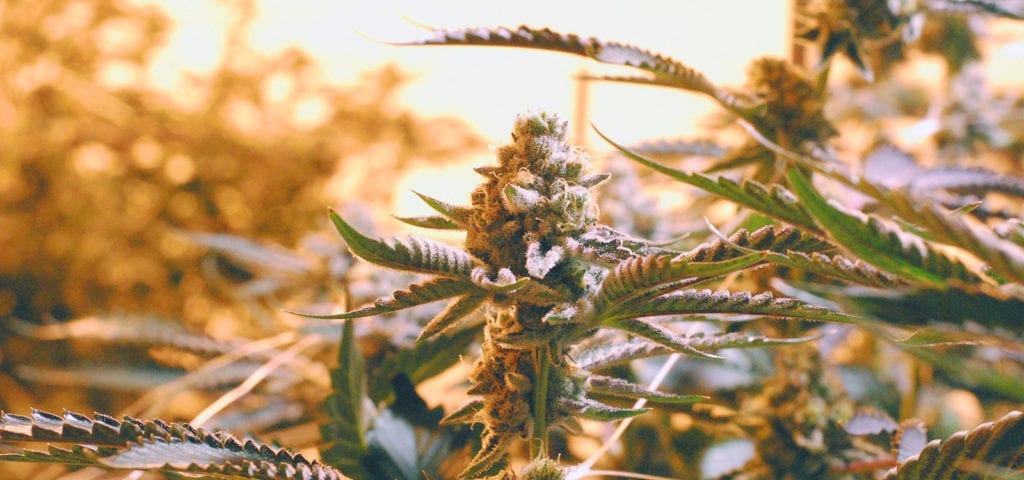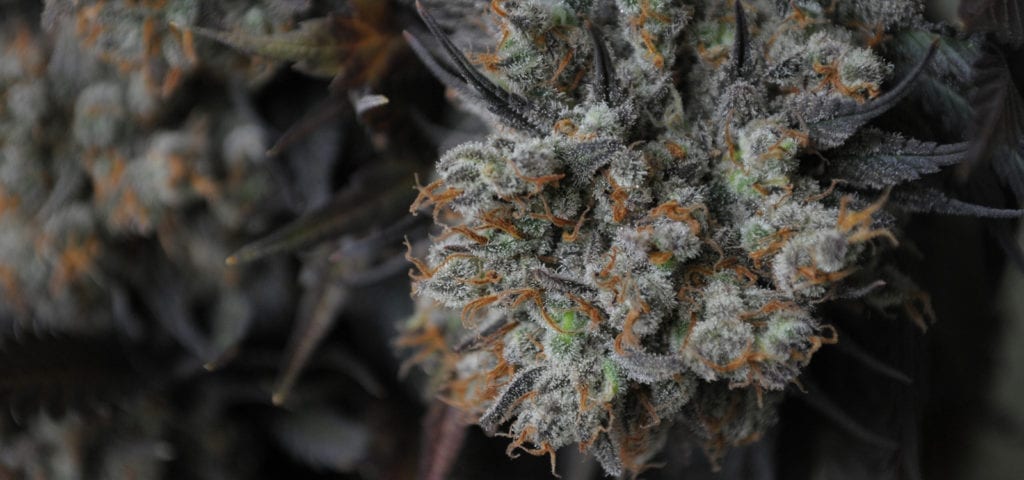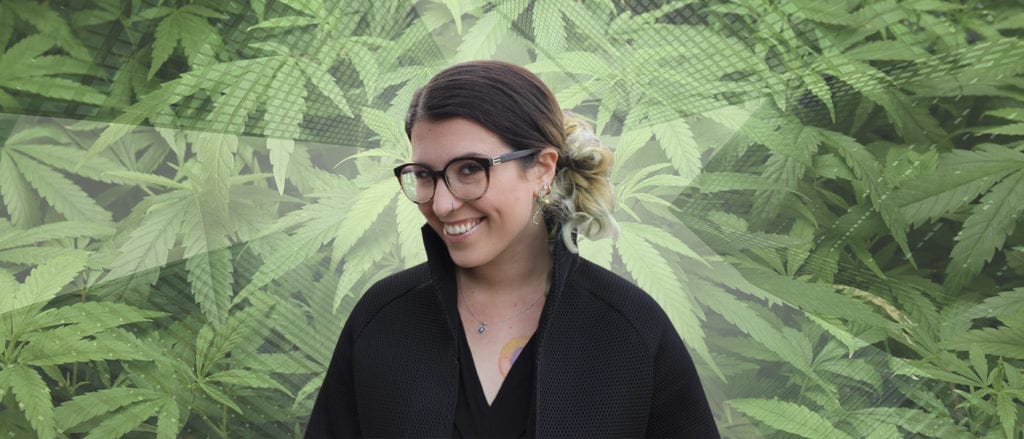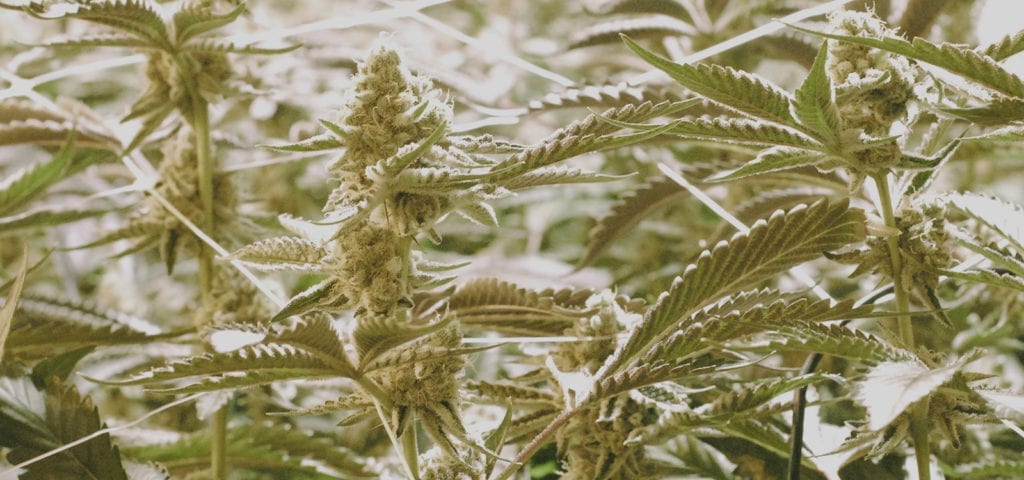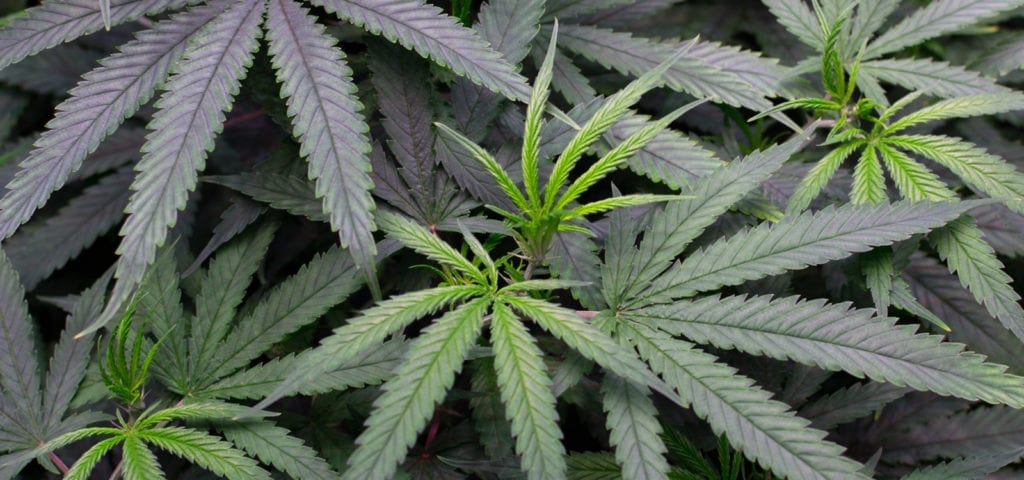Emma Chasen is the Director of Education for Sativa Science Club, an organization that encourages industry-wide quality standards. She also, in 2016, received the Willamette Week‘s Portland, Oregon Best Budtender award.
In this Ganjapreneur.com podcast episode, Emma joined our host TG Branfalt for a conversation about the creation process behind her educational courses for individuals seeking careers in the cannabis space and why she thinks the cannabis industry should move away from the indica/sativa binary of categorizing cannabis cultivars. The interview also covers how she became a budtender for Farma (a Portland, Oregon-based dispensary that emphasizes a scientific definition and understanding of cannabis), her rise through the ranks of the cannabis space to eventually become the dispensary’s general manager, and what advice she would offer to somebody who is working in — or interested in — the retail side of the cannabis industry.
Tune in to the interview via the player below, or scroll down to read a full transcript of this week’s Ganjapreneur.com podcast episode!
Listen to the podcast:
Read the transcript:
TG Branfalt: Hey there. I’m your host TG Branfalt. You’re listening to the Ganjapreneur.com podcast, where we try to bring you actionable information and normalize cannabis through stories of ganjapreneurs, activists and industry stakeholders. Today I’m delighted to be joined by Emma Chasen. She is a cannabis science educator and consultant for the Sativa Science Club. She’s had a really interesting path to the cannabis space. She began it sort of at Brown University and in 2016, in her role at Farma she was named Portland, Oregon’s Best Budtender, but I’m going to let her tell that story myself — how are you doing this afternoon Emma?
Emma Chasen: I’m doing great TG. Thanks so much for having me.
TG Branfalt: Absolutely thrilled. I briefly sort of gave away a little bit about your background, but why don’t you tell us the story, how did you end up Portland, Oregon’s Best Budtender?
Emma Chasen: Sure. It was definitely a bit of a windy road. I did graduate from Brown University in 2014 with a specialized degree, biology degree. Part of what makes Brown so cool and wonderful is that they really let you do whatever you want. I was able to devise my own track within the biology program to really study medicinal plant research and ethnobotany. So, the way in which indigenous peoples have used medicinal plants over centuries and centuries. I came out of Brown not really sure about what I wanted to do. I was considering going the naturopathic route. So, becoming a naturopathic doctor, but I definitely did not want to jump into another five years of schooling. So, I took a job at Brown University Oncology Research Group where I was helping to coordinate Clinical Oncology trials nationwide and I naively thought that that was going to be my point of impact.
Because this was 2014, 2015. So, the cannabis movement was just starting to gain traction. Of course, it had been growing out here for a while, but out on the East Coast it’s a different story, different culture. I was excited that there was a little bit of momentum, especially in Rhode Island medical marijuana had passed. So, I thought, “Okay, maybe we can do some cannabis trials. That would be awesome and super cool.” Lo and behold, there was actually a brilliant professor from Brown who did propose a cannabis trial to my supervisor at the time and she did not even give him the time of day. She just laughed him out of the office and that was kind of the straw that broke the camel’s back for me in terms of just being done with that job.
I saw how much the cancer industry … how much money the cancer industry makes for one and just how much it profits off of people being sick. I was really disillusioned with that and came out of that job, moved back home to New York for the summer, because I’m from New York and just like, you know what, I need a new adventure in my life and so I packed up my car and drove across the country to Portland, Oregon, not even knowing if I wanted to get into the cannabis space, just knowing that there was more opportunity out here for the holistic medicine industry and jobs, but it was perfect timing, really synchronistic in that cannabis was just becoming legal for adult use. So anybody 21+ could start buying cannabis in October of 2015 and I got to Portland September of 2015.
So, everybody in the cannabis industry was hiring to prepare for this and I also, very luckily, found my way to Farma, which is a very popular dispensary in Portland that takes a more scientific to cannabis and at first I was like, “You know what, I don’t want to work in retail weed. I want to work in research or science or something else.” But I took the job because I needed the job, I needed money, and I ended up falling in love with it. I fell in love with the plant. I fell in love with learning about the plant and learning about all the different science of cannabis, behind cannabis, and I also loved connecting with consumers and really helping them reframe their relationship with cannabis as medicine, and helping them to kind of take control of their own health and wellness journey and regain some agency with this awesome medicinal plant. And so I stayed there, I stayed in Farma in total for about two years, but I budtended for about four to five months and then I was named, of course, Portland’s Best Budtender by the Willamette Week readers poll in 2016, which was awesome, and then quickly after that became Farma’s general manager.
TG Branfalt: What about Sativa Science Club? Explain to the listeners what that is.
Emma Chasen: Yeah, sure. Sativa Science Club is a really collaborative effort to support the cannabis industry at large and a lot of the way in which we believe that we can support the industry is through education. I linked up with Sativa Science Club founder, Mary J. Poppins, in June 2017 and we just found that we had a lot of similarities in terms of our goals and hopes and visions for supporting the cannabis industry. I had stepped down from my position as GM at Farma in April of 2017 to really start to cultivate and develop a comprehensive training curriculum for industry professionals, because there just was not any kind of training on cannabis science or empathetic client care, patient care as I call it. So, the ability to really take this science, this foundational information on cannabis and distill it in a way that is accessible and meaningful to consumers in a high-traffic retail environment, it takes a little bit of finesse.
I got to work as Farma’s director of education in April of 2017, after I stepped down as their GM, to really develop a training program and then linked up with Mary of Sativa Science Club in June. Found out we had a lot of similarities and we started working together to kind of workshop classes throughout the summer and then in September of 2017 I ended up officially transitioning out of Farma and working with Sativa Science Club to develop what we call now the Core Science Certification Program. So, it is a comprehensive training program that takes you through cannabis botany, cannabis compounds, the endocannabinoid receptor system, consumption methods, as well as empathetic or compassionate client care. This curriculum was reviewed by a board of scientists so that we can make sure that all the information is good and airtight.
I mean, we don’t know a lot about cannabis right now. We have a little bit of information, but even that little bit of information has been enough to create this training program and I do believe that it’s enough to elevate the industry from the conversations that are so commonly being had now.
TG Branfalt: That’s really cool stuff. At Farma, correct me if I’m wrong about this, but you guys rejected the indica/sativa binary, instead focusing on chemotypes to determine effect. Would you please explain what that means?
Emma Chasen: Absolutely. At Farma, that was really the place where I got my foundational understanding of cannabis and what Farma does, which is really pretty radical when you look at the way in which other dispensaries talk about cannabis flowers. They reject this indica/sativa binary. In cannabis, we commonly associate cannabis indica with being super sleepy and “in-da-couch” and cannabis sativa as really energizing and kind of hyperactive. However, that dichotomy is incorrect for a couple of reasons. One, cannabis indica and cannabis sativa only describe the way in which plants will grow.
So, when these species were first classified by philosophers and scientists in the 1700s, they never smoked these plants, they never consumed these plants and then wrote down in their notes like, “Oh, cannabis indica, super sedative.” All they did was outline like, “Oh, cannabis indica grows short and bushy, has dense compact flowers, whereas canvas sativa grows tall and skinny, has loose flowers.” Even at the creation of these terms there is no account that they were ever associated with effect to begin with. However, if they were at some point associated with consistent experience, it still would not matter now because everything on the current cannabis market is genetically a hybrid. Everything has been crossed and prolifically bred so many times that all current cannabis cultivars are a combination of indica and sativa genetics.
It doesn’t make sense to look up online or look up on Leafly and go, “Oh, Grape Ape. They say that that’s cannabis indica. You’ll definitely get a super sedative effect from that strain every single time.” We don’t have that consistency in the supply chain yet and also, if you think about it, it just makes more sense to look at the actual chemical compounds found inside of a plant’s matrix to determine what effect or what experience it will induce and that’s because we are actually physically consuming those compounds. We’re not consuming indica or sativa, that’s kind of like amorphous term that doesn’t really tell us much about the way in which it’s going to affect us. We’re consuming the compounds that will then alter our physiology and create a specific experience.
So, when we say we reject the indica/sativa binary and instead look at the cannabis chemotype to determine effect, the cannabis chemotype is those chemical compounds found inside the plant’s matrix that actually alter our physiology to determine or create a certain experience. At Farma we never classified our cannabis and they still don’t base on the indica/sativa binary. Instead, we looked at every single cultivars lab results, cannabinoid potency as well as terpene potency to better project an experience or effect.
TG Branfalt: In a lot of my conversations I’ve been having, especially recently and this I’ve sort of noticed in the last year with business owners and growers, is there seems to be this movement towards terpene content versus strain names when it comes to marketing, when it comes to how they discuss that with their clients. Would you like to see an industry wide shift toward marketing cannabis flowers differently?
Emma Chasen: I would. I would definitely like to see this removal of the indica/sativa binary as this thing that we hold onto so tightly to tell us an experience. I think that, especially moving forward and as the legal cannabis industry evolves, consumers are going to demand predictability and consistency in their medicine. If we continue to just look at the indica/sativa binary or strain names to help us determine effect, then we will not be delivering that consistency to our consumers. To me, that’s inexcusable because then you’re potentially losing consumers and there is still a lot of negative stigma out there about cannabis and we can’t really afford to lose consumers at this point.
We need to create a different kind of approach. I do think that strain names, they’re a great marketing tool. I think that they’re an easy way to entice consumers to try something out. However, we need to be expanding the conversation and looking at the terpene content as well as the cannabinoid content, as well as the genetics, to better determine or predict an experience for the consumers, so that they can have that greater or higher level of consistency and predictability in their medicine.
TG Branfalt: I want to dig a bit deeper into sort of this education process that you do and sort of your experience with that, but before we do that we’ve got to take a break. This is Ganjapreneur.com podcast. I’m TG Branfalt.
If you were looking for a job in the rapidly growing and highly competitive cannabis industry, Ganjapreneur.com is the place to look. Visit the Ganjapreneur job board today to browse current openings with cannabis companies throughout the United States, from entry level budtender positions to executive level career opportunities. You can also create a profile and upload your resume to be discovered by cannabis recruiters. Visit our job board at Jobs.Ganjapreneur.com to create your profile today.
If you are a business owner, you can post your job openings for as little as $25 on our job board to reach the largest and most engaged audience of cannabis professionals on the web. Companies who are listed in the Ganjapreneur business directory are eligible for free job listings. If you’re already signed up, contact us today via the website or send us an e-mail at Grow@Ganjapreneur.com to activate your unique coupon.
TG Branfalt: Hey, welcome back to the Ganjapreneur.com podcast. I’m your host TG Branfalt, here with Emma Chasen, cannabis science educator and consultant for the Sativa Science Club. In your opinion, somebody who educates people on the cannabis plant, what do you think is the biggest gap in the cannabis knowledge base of consumers?
Emma Chasen: I think that it is this indica/sativa question. A lot of novice consumers who are looking to try out cannabis or explore cannabis look to popular blogs on the internet, look to sites like Leafly to help them kind of uncover the language needed to speak about cannabis. So, they find a lot of indica and sativa, cannabis indica makes you sleepy, cannabis sativa makes you energized. So, that’s still one of the biggest gaps in education that I see and dispensaries in the legal industry proliferate this idea and that definitely doesn’t help either. There’s also, as the CBD market continues to rise a huge gap in understanding the difference between hemp derived CBD and cannabis derived CBD. I can explain a little bit about that quick rundown.
TG Branfalt: Absolutely.
Emma Chasen: Hemp derived CBD and cannabis derived CBD, they are the same molecules. If you pulled out CBD from hemp and you pulled out CBD from cannabis they would look exactly the same. They are exactly the same. However, hemp took a very different breeding pathway than the cannabis plant or the “drug cultivar cannabis”. Hemp is actually a subspecies of cannabis sativa. However, it was never bred prolifically like the drug cultivar cannabis for its secondary compounds. Secondary compounds are the compounds like cannabinoids and terpenes that actually have or hold the medicinal qualities of cannabis.
Instead, hemp was bred for its primary compounds or its fibers and proteins. It was bred to clean up soil. It was bred to eventually be made into a textile or paper, food, and these are all breeding techniques specifically for primary compounds. So, you don’t really get this high level of secondary compounds. Whereas cannabis, or the drug cultivar cannabis, was bred only for its secondary compounds and it was bred illegally for a very long time for its cannabinoid potency, for its terpene potency, and this created quite a diverse range of secondary compounds. Cannabis’ real medicinal efficacy lies in this diverse range of secondary compounds and this is a theory called the entourage effect, that all of these secondary compounds are working together to create the most medicinal experience possible.
When we talk about hemp derived CBD tinctures or products, it can still be medically efficacious, it can still work because again, that CBD molecule is the same whether it’s in hemp or this cannabis drug cultivar. However, it does not have that full range of secondary compounds behind it to support the way in which CBD interacts with our physiology. You may find that your hemp derived CBD tincture doesn’t work as well as something that’s a cannabis derived CBD tincture. Also, you need to watch out for companies who are just looking to capitalize on the CBD movement. There are a lot of the elixirs that are sold online, that are sold on Amazon that really highlight, oh, CBD tincture, but then you read the fine print and it’s just hemp seed oil.
There are a lot of companies who are, unfortunately and really awfully, trying to pull one over on the consumer market and profitize on the CBD movement. So, just be careful. If you are looking to source hemp CBD, you can find reputable companies, you can find companies who are testing for both pesticides and potency and you can find something that is really clean and effective, you just have to do your research. Don’t just click on any CBD tincture that you find. Make sure that you read the fine print. The wonderful thing about hemp CBD is that it is legal. It is federally legal. So, it is accessible in all 50 states. It is accessible nationwide. So, if you do find that maybe you could benefit from CBD medicine. If you’re looking to try it out, but you’re not currently in a legal cannabis state, then you can source hemp CBD product, just make sure you do your research.
TG Branfalt: The other question I have for you is the … you said earlier that we don’t know much about the cannabis plant, we really only had 50 years of research on this plant. I mean, this might be a loaded question here, but what do you think is the biggest gap in sort of this knowledge base? What are we missing, do you think, that would help us maybe connect some dots or paint the picture a little clearer?
Emma Chasen: Sure. We’re missing a large portion of those secondary compounds in cannabis’ plant matrix. So, in my previous answer, when I described how cannabis’ real efficacy lies in that full range of secondary compounds, we only know a very small fraction of what those compounds actually are and what they do. Right now we really only know that there are cannabinoids, terpenes and flavonoids, but we don’t even really know how the flavonoids interacts with the cannabinoids and terpenes and there have been predicted or hypothesized to be hundreds and hundreds of compounds in the cannabis matrix and we only know three classes of them, the cannabinoids, terpenes and flavonoids. Again, we only really know what two of those, the cannabinoids and terpenes, actually do and how they work, and still, with those two classes, we don’t quite fully understand how they’re interacting with our physiology. We need a lot more research to uncover the rest of the secondary compounds in the cannabis matrix so that we can better understand how cannabis can be used as medicine.
TG Branfalt: Who do you think should be leading the way in this research? Right now a lot of private entities and legal states are working to map the genome or do other research like that. There’s a higher education programs that are working primarily with hemp. There’s a good one in New York. There’s a great one in Vermont. State governments are issuing reports, but not really doing research. The federal government has no interest, but who do you think should be leading the research efforts?
Emma Chasen: I think that higher education is always a great way to conduct and fund research. However, higher education gets tricky. If it’s federally funded, then they don’t really want to touch cannabis. The state doesn’t really give much money to support research efforts on cannabis, so that leaves you with private entities, which can gain funding from a variety of different investors to do this kind of research and with that I’m slightly conflicted on whether I like the fact that private entities are leading research. I do think that there are many private entities such as Phylos Bioscience here in Portland, that is a cannabis genomics company that is trying to synthesize the entire cannabis genome, but they also have this nonprofit that’s part of their organization called the Open Cannabis Project that looks to publish this information in open source so that nobody can patent the cannabis genome.
I think that that is really important, this discussion of patents that’s coming out of private entities doing research will definitely impact the way that the industry can move forward and I am not a big fan of patents or patenting cannabis. I think that that is an awful road to go down. The federal government already has a couple of patents out on cannabis and that will just make sure that only a very few number of really rich people are allowed to grow certain cultivars or certain cannabis genetics and that is not the way that I want to see this industry move forward. I want to make sure that everybody has access and the ability to grow this plant and that not a couple of rich people own it. Private entities, I think that they’re good for now. I think that moving forward, as the legalization movement gains more traction and it spreads, I think that higher education would also be the be a great place to conduct much of the research.
TG Branfalt: I’ve got to, I really have got to agree with you that, especially … as the conversation on a federal level here, do we deschedule it, do we reschedule it and I warn people quite frequently if it’s rescheduled, it’s going to put cannabis in the hands of pharmaceutical companies and people who can get FDA approval. I just think it’s worth noting that the deschedule versus reschedule conversation and I want to talk about some more Oregon-centric issues and topics and about your work at Farma. Before we do that we got to take a break. This is Ganjapreneur.com podcast. I’m TG Branfalt.
At Ganjapreneur we have heard from dozens of cannabis business owners, who have encountered the issue of cannabias, which is when a mainstream business, whether a landlord bank or some other provider of vital business services refuses to do business with them simply because of their association with cannabis. We have even heard stories of businesses being unable to provide health and life insurance for their employees because the insurance providers were too afraid to work with them.
We believe that this fear is totally unreasonable and that cannabis business owners deserve access to the same services and resources that other businesses are afforded, that they should be able to hire consultation to help them follow the letter of the law in their business endeavors and that they should be able to provide employee benefits without needing to compromise on the quality of coverage they can offer. This is why we created the Ganjapreneur.com business service directory, a resource for cannabis professionals to find and connect with service providers, who are cannabis friendly and who are actively seeking cannabis industry clients.
If you are considering hiring a business consultant, lawyer, accountant, web designer or any other ancillary service for your business go to Ganjapreneur.com/businesses to browse hundreds of agencies firms and organizations who support cannabis legalization and who want to help you grow your business. With so many options to choose from in each service category, you will be able to browse company profiles and do research on multiple companies in advance so you can find the provider who is the best fit for your particular need. Our business service directory is intended to be a useful and well-maintained resource, which is why we individually vet each listing that is submitted. If you are a business service provider who wants to work with cannabis clients, you may be a good fit for our service directory. Go to Ganjapreneur.com/business to create your profile and start connecting with cannabis entrepreneurs today.
TG Branfalt: Hey, welcome back to Ganjaprenuer.com podcast. I’m your host TG Branfalt here with Emma Chasen, cannabis science educator and consultant for Sativa Science Club, super smart. How do you think, if at all, your approach to cannabis led to your Best Budtender win in 2016?
Emma Chasen: I think that one, having a foundational understanding of how the cannabis plant interacts with human physiology really does help budtenders and it definitely helped me make better predictions for how that cannabis cultivar will make somebody feel and that is really important. When you’re working with a customer, if you give them a prediction and that prediction turns out right, then they’re more likely to come back to you and get medicine from you. There are also, of course, are other things that I would always include in the conversation such as dosing guidelines. So, telling people how to specifically use this product, maybe start at night if you’re a novice just in case you experience some drowsy effects you could sleep it off. Start with a very, very low dose or a micro dose and then wait a few minutes, wait 10 minutes to see how that product makes you feel before consuming more so that way you can ensure that you won’t have such an uncomfortable experience if it doesn’t work for you.
I also definitely prize myself, I guess, on my ability to take really scientific jargon-heavy concepts and distill them down in a way that a lay person can understand. So, being able to explain these kinds of scientific concepts in a way that is accessible and not alienating, because I think that a lot of times when people do try to educate, it creates this like distancing or othering of the other person on the other side of the conversation because they don’t know it or they feel like you’re patronizing them or whatever it may be. So, I always tried and I always did meet people where they were at and if they weren’t looking for the education, then I wasn’t about to give it to them.
A lot of people ask me all the time like, “Well, what happens if you do get a customer who comes in and is like, ‘I want your heaviest cannabis indica.’ What do you say to that?” My response is there are ways to very slyly insert some education in that conversation and so if somebody comes in and says, “I want a heavy cannabis indica.” I’m not going to correct them, that is like customer service 101, the customer’s always right. I then follow up with what a question, “Okay, what kind of experience are you looking for? Do you want something that’s more sedative?” Usually they’ll say, “Yeah, I want something to just put me out, again, heavy indica.” And maybe then I’d pull out a cultivar for them to smell and talk about how it has a high concentration of THC and a high concentration of a terpene called myrcene and myrcene is found abundantly in hops.
So, think when you drink a few beers and you get drowsy. Well, that’s what this call cultivar is going to do to you. Never in that conversation did I say, “You’re wrong. Indica is wrong.” You can’t say that. Never did I also say, “Oh yeah, I’m going to get you a cannabis indica, a heavy indica.” I kind of did my own sly insertion of education and they took home something that hopefully will give them the experience that they want and maybe that planted a tiny seed so that the next time they come into the dispensary they’ll ask for something that’s high in myrcene instead of an indica. I think that that approach made me really successful as a budtender. It’s this combination of being able to explain cannabis science to people or introduce them to cannabis science in a way that is not othering or alienating and then also combining that with a really high level of customer service, which includes active listening, which includes eye contact, open body language, like a high degree of excitement.
A lot of people who come into a dispensary are really, really excited to be there and so the budtender has to match that excitement, otherwise it’s going to be a little bit of a disappointment for the customer. So, really all those things combined. That high level customer service casual professionalism, plus this foundational understanding of cannabis science and being able to articulate it in a way that makes sense to people.
TG Branfalt: In my sort of daily news writing and conversations with industry owners, a lot of people say that Oregon’s program is one of the more interesting in terms of the employment there, you have to get a permit as an employee, and the program was recently criticized by the US Oregon District Attorney Billy J. Williams, saying that it has a massive overproduction problem among other things. Talking a lot about diversion. As somebody who’s been in the industry, what changes, if any, would you like to see in Oregon’s adult-use regime and is William’s criticisms worthwhile?
Emma Chasen: Well, I think that Oregon, out of the legal recreational states thus far, actually does have one of the better programs. The legislature is, I think, a lot better than the approach that Colorado and Washington took in that the craft industry really thrives in Oregon, specifically Portland, and we’ve seen that with craft coffee, craft wine, craft food and so why not craft cannabis? It is true that there is a strong foothold of this craft movement here. I’m part something called the Craft Cannabis Alliance here in Oregon, that really seeks to make sure that small, home-grown Oregon owned companies really make it in this industry, because it is tough.
To comment on this massive overproduction problem that we’re seeing in Oregon, it’s true. We are seeing a massive overproduction problem. This past fall market and flooded with products, specifically cannabis flour and nobody was buying it. That drove the prices down in an insane amount. I mean, I heard of pounds being sold for $200, which is awful. I mean, you cannot make money off of that. However, this is not a problem specific to Oregon. We’ve seen this problem happen in Colorado. We’ve seen it happen in Washington. I’m sure it will happen in California, where the state does not put a moratorium or a cap on licenses. It’s free market. It’s capitalism. Anybody can go out for a license. However, at this point there are only about 14% of the population in Oregon that consume cannabis and that number is not growing.
You bring on more licenses, you bring on more businesses that have more product and yet your consumer base isn’t growing. So, it’s inevitable that some of those companies are going to drop out or turn to black market, which a lot of them are. There are two solutions, a few solutions I see to this problem. One, the state could put a cap on licenses and say, “You know what? There are only allowed this many licenses in the state.” However, a lot of people do not jive with that idea because capitalism, free market, we want to let everybody have a chance, which I totally get. The next thing would be, okay, as the East Coast starts to legalize, as Vermont, as New Jersey, as Maine, Massachusetts legalize, you can’t really grow great cannabis naturally out there. You have to grow it in a warehouse, which, of course, is not very sustainable and costs a lot more money and is not good for the environment.
Then the solution becomes, “Well, if we have all this product out in Oregon, that is arguably the best cannabis product that you are going to get. This is the place that has been growing cannabis forever. It’s the place that has been supplying the East Coast black market forever, so why not regulate that? Why not allow Oregon companies to ship product out to East Coast legal States and have that flower be sold in their dispensary instead of popping up all these warehouses that are just generating “botox weed”, as I call it. So, that would be a larger solution. However, of course, then you need to get the feds involved because you’re crossing state lines. It’s not something that’s going to happen right away, but it’s something that long term could potentially really help the Oregon market, but I think that for right now it’s really making sure that these craft companies do survive because they are the heart of the Oregon market and that in this shakeout not having just like a few highly capitalized companies kind of win out.
TG Branfalt: Are you, with the recent changes in federal policy, the revocation of the Cole Memo, are there any fears of crackdown among operators in Oregon?
Emma Chasen: I think it was a big scare when Sessions rescinded the Cole Memo. People definitely freaked out a little bit. However, as long as the state’s attorney general is cool with it, as long as they are not going to come after the program, then it’s going to be okay, and they’re not going to come after the program unless people are not remaining in compliance. So, unless people are selling to black market prolifically and the whole kind of market and industry just bottoms out, which again, it is definitely a risk right now with this kind of market shakeout that’s happening. However, I don’t think that the state’s attorney generals are going to go after companies and just shut the industry down.
I mean, it’s making a ton of money for the state, millions of dollars in tax revenue are coming in. There are now a ton of jobs that are being created due to this industry. There are people who are not dying of opioid overdoses. I mean, we’ve seen in every single sector how this industry can benefit the states and so, unless we have an industry wide problem of everybody turning to black market activity, then I don’t think that there is really going to be a major shutdown.
TG Branfalt: Usually I end these interviews by asking what advice would you have for entrepreneurs, but really, I think what I want to know from you is, what advice do you have for people interested in working on the retail side, working in the customer service aspect of the cannabis space?
Emma Chasen: I’d say, “Do your research. Learn.” You can now take our program at SativaScienceClub.com. You could take the core science certification program from anywhere in the world because we do have it set up for online students as well. So, make sure that you learn about cannabis, make sure that you learn how to talk about it and then do your research and really target the dispensaries that you align with, and then take whatever position you can get there. This is the main thing I say to everybody looking to get into the cannabis industry, just get your foot in the door.
I mean, when I got to Portland I didn’t want to be a budtender working for $12 an hour. That was not something that I wanted to do, but I did it and then I worked my ass off to find my niche and made connections and networked until I eventually got where I wanted to be. So, do your research, learn as much as you can about cannabis and about how to talk to people about it and then go out and just take a position that you can, meet people, connect and continue climbing your way.
TG Branfalt: I really want to thank you for being on the show. This has been really, really cool. You have a fountain of knowledge. You know a lot more than I do, that is for sure. Where can people find out more about you more and more about the Sativa Science Club, other projects that you might have going on.
Emma Chasen: Sure. You can find Sativa Science Club at SativaScienceClub.com and you can find out all about the training and workshops that you can take through there. You can also find me and the work that I do at EmmaChasen.com. You can also find me on Instagram and Facebook. So, my socials. On Instagram I’m echasen. Facebook, Emma Chasen. Same with Sativa Science Club. You can find them all over social media, Instagram, Facebook and the like.
TG Branfalt: Again, thank you so much for taking the time to come on the show. It’s really been delightful and I definitely look forward to talking to you again for sure.
Emma Chasen: Yes, thank you so much for having me on. It’s been my pleasure. So fun.
TG Branfalt: You can find more episodes of the Ganjapreneur.com podcast in the podcast section of Ganjapreneur.com and in the Apple iTunes store. On the Ganjapreneur.com website you’ll find the latest cannabis news and cannabis jobs updated daily, along with transcripts of this podcast. You can also download the Ganjaprenuer.com App in iTunes and Google Play. This episode was engineered by Trip Media House. I’ve been your host, TG Branfalt.
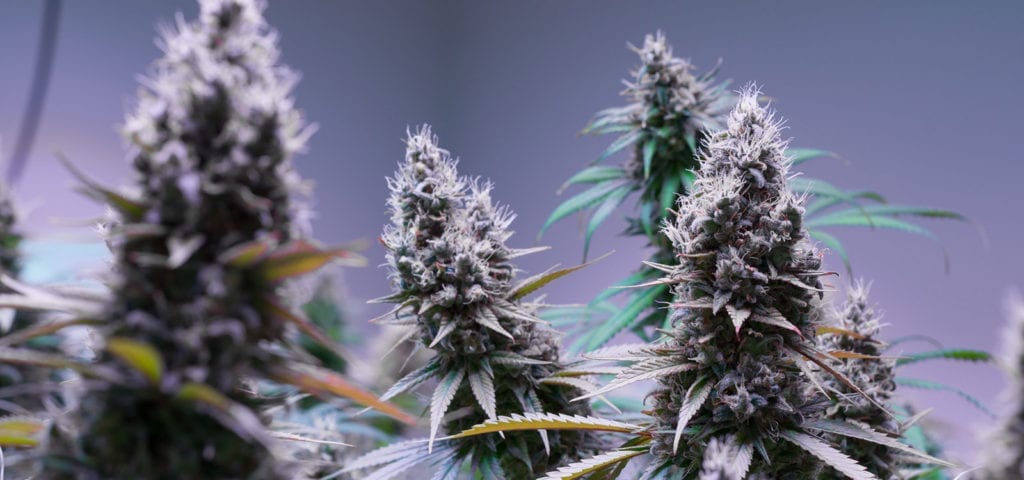


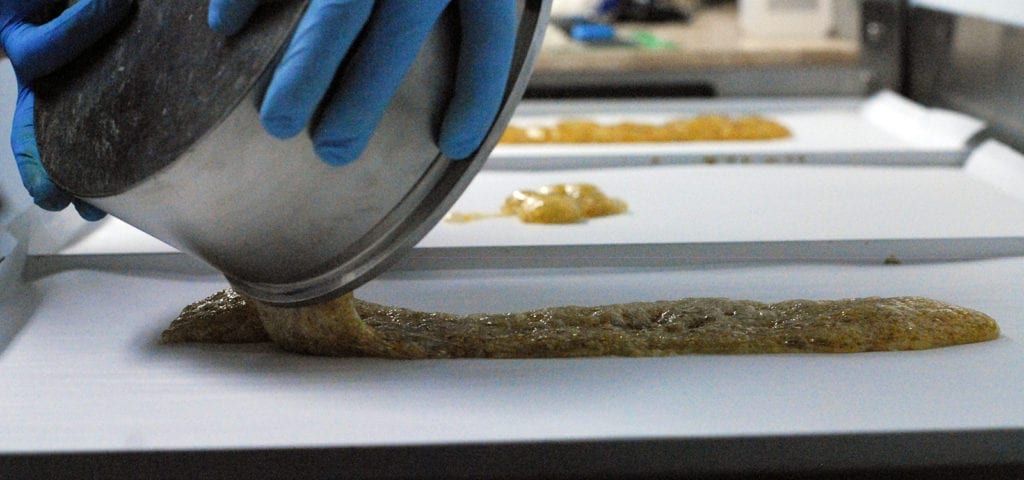

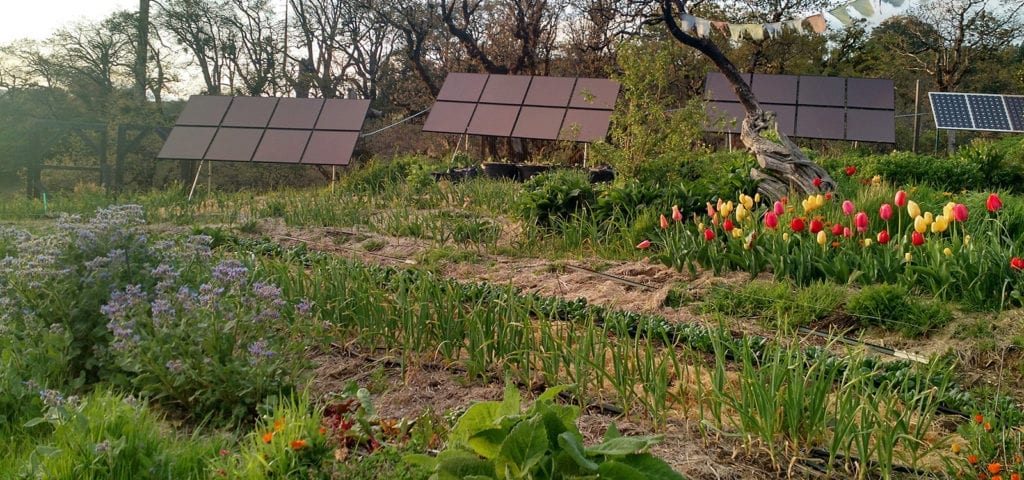
 In these days of growing industrialization in our beloved cannabis industry, it is heartening to find a farm holding steady to the high ideals of community commerce and environmental stewardship. Casey and Amber O’Neil are the proprietors of
In these days of growing industrialization in our beloved cannabis industry, it is heartening to find a farm holding steady to the high ideals of community commerce and environmental stewardship. Casey and Amber O’Neil are the proprietors of 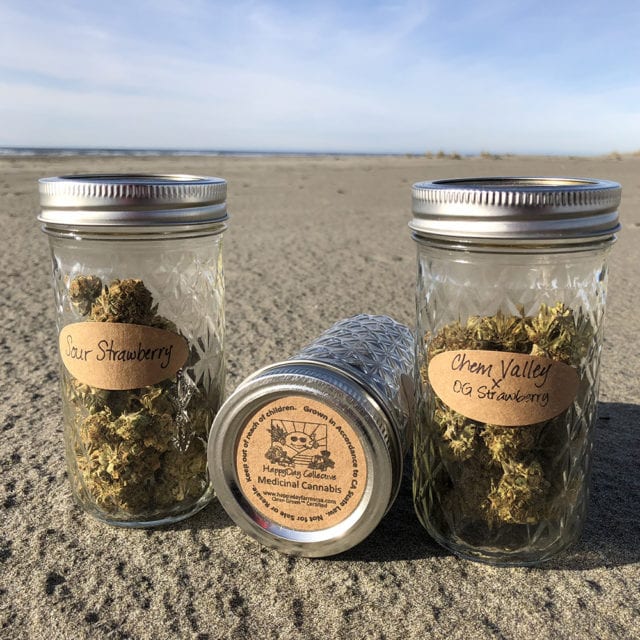
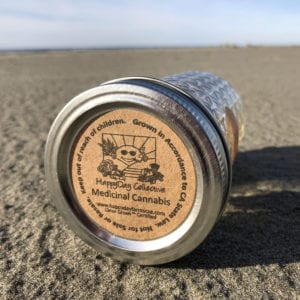 “A
“A
